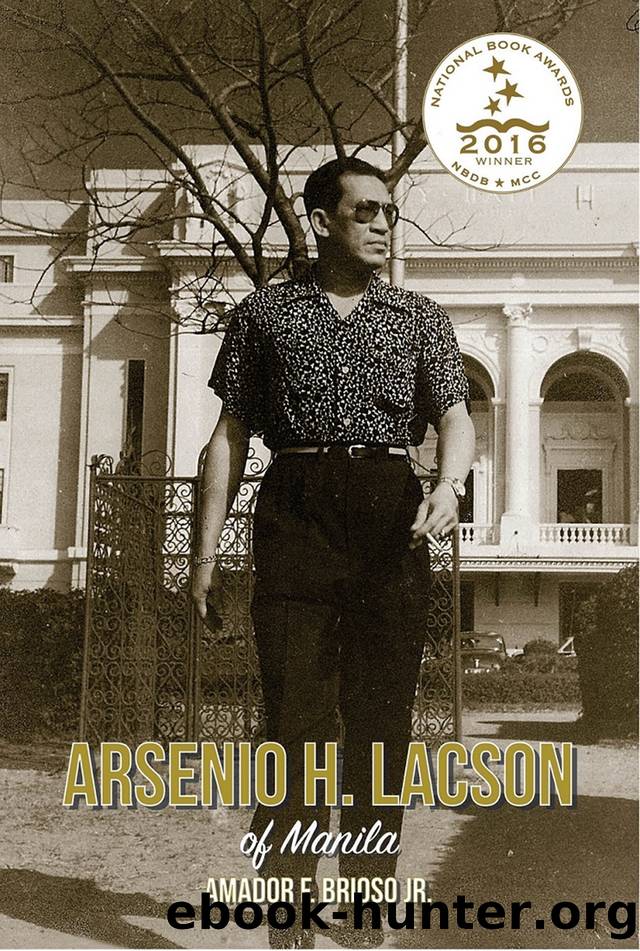Arsenio H. Lacson of Manila by Amador F. Brosio Jr

Author:Amador F. Brosio Jr. [Brosio, Amador F. Jr.]
Language: eng
Format: epub
Tags: Biography & Autobiography, Political
ISBN: 9789712731815
Google: gzWWDwAAQBAJ
Publisher: Anvil Publishing, Inc.
Published: 2017-10-20T06:28:05+00:00
Another matter which Lacson tackled was the issue of American abuses being committed in the Philippines.
In Olongapo, there were rampant abuses being committed by the US Navy. In his radiocast, Lacson called on the government to take prompt and drastic action on these abuses because ânational honor and dignityâ demanded that the government should do so.
Commenting on the speech of US President Dwight Eisenhower who reaffirmed the faith of Americans in their heritage of freedom and human dignity, Lacson said: âThey are words that hit the high keys of human freedom and dignity. But apparently their meaning is lost to other Americans ten thousand miles across the seas, Americans manning the American naval base at Olongapo, and who by their abuses, their brutality and arrogance perpetrated on the helpless civilian population of a friendly country, deny the very creed by which their nation swears.â
To prevent any such abuses from being committed by Americans in his jurisdiction, Lacson issued an order on July 28, 1955 revoking the special privileges of American servicemen in Manila which were under the standing courtesy agreement with the Philippine-based US armed forces units. Thus, unlike in the past where American servicemen were not subject to arrest by Manila police but would merely be turned over to their superiors, by virtue of this Lacson directive, whenever an American serviceman was caught mauling any Filipino or disturbing the peace, he would be arrested, tried and jailed like any other Filipinos.
There was an instant outcry against Lacsonâs order. It was the first order of its kind as not even a national official or any other local official had ever issued such an order. Lacson was promptly accused of being anti-American, that his move was untimely, unwise, and smacked of base ingratitude for all that Americans had done to the Filipinos. The Lacson order prompted the US ambassador to the Philippines, Homer Ferguson, to assure Vice President and Foreign Affairs Secretary Carlos P. Garcia that the Olongapo problem would be solved satisfactorily and that the situation there would return to normal in due time.
President Ramon Magsaysay was said to have been displeased by Lacsonâs directive.
In his radio program, Lacson railed at accusations against him of supposedly being anti-American. Saying that anti-Americanism âis a strange accusation to make, considering that today is hardly the time for a man in his right senses to be anti-American,â Lacson declared that to be anti-American now would be stupid, not when the Americans are here in such number and strength and in such positions of honor and influence as they occupy. The Filipinos may be anti-American in the sense that they are âanti-certain things that are tragically a part of American life, if not of American ideals,â he added, declaring, âWe are against racial discrimination.â
Download
This site does not store any files on its server. We only index and link to content provided by other sites. Please contact the content providers to delete copyright contents if any and email us, we'll remove relevant links or contents immediately.
Machine Learning at Scale with H2O by Gregory Keys | David Whiting(4285)
Never by Ken Follett(3924)
Harry Potter and the Goblet Of Fire by J.K. Rowling(3837)
Unfinished: A Memoir by Priyanka Chopra Jonas(3367)
Fairy Tale by Stephen King(3361)
The Man Who Died Twice by Richard Osman(3057)
Will by Will Smith(2894)
Rationality by Steven Pinker(2345)
It Starts With Us (It Ends with Us #2) by Colleen Hoover(2320)
Can't Hurt Me: Master Your Mind and Defy the Odds - Clean Edition by David Goggins(2316)
The Dark Hours by Michael Connelly(2295)
The Storyteller by Dave Grohl(2214)
Friends, Lovers, and the Big Terrible Thing by Matthew Perry(2209)
The Dawn of Everything: A New History of Humanity by David Graeber & David Wengrow(2185)
The Becoming by Nora Roberts(2181)
The Stranger in the Lifeboat by Mitch Albom(2107)
Cloud Cuckoo Land by Anthony Doerr(2083)
Love on the Brain by Ali Hazelwood(2050)
Einstein: His Life and Universe by Walter Isaacson(1998)
